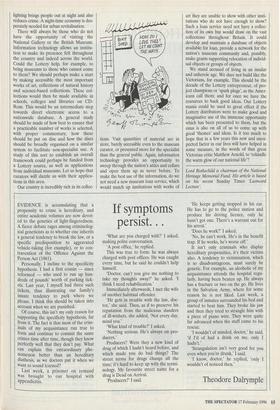If symptoms
persist. . .
EVIDENCE is accumulating that a propensity to crime is hereditary, and entire academic volumes are now devot- ed to the genetics of light-fingeredness. A fierce debate rages among criminolog- ical geneticists as to whether one inherits a general tendency to break the law, or a specific predisposition to aggravated vehicle-taking (for example), or to con- travention of the Offence Against the Person Act (1861).
Personally, I incline to the specificity hypothesis. I had a first cousin — since reformed — who used to run up hun- dreds of pounds' worth of parking tick- ets. Last year, I myself had three such tickets, thus illustrating our family's innate tendency to park where we please. I think this should be taken into account when we are punished.
Of course, this isn't my only reason for supporting the specificity hypothesis, far from it. The fact is that most of the crim- inals of my acquaintance run true to form and continue to commit the same Crimes time after time, though they know perfectly well that they don't pay. What can explain this extraordinary phe- nomenon better than an hereditary diathesis, as we doctors put it when we want to sound learned?
Last week, a prisoner on remand was brought to our hospital with appendicitis. 'What are you charged with?' I asked, making polite conversation.
'A post office,' he replied.
This was true to form: he was always charged with post offices. He was caught every time, but he said he couldn't help himself.
'Doctor, can't you give me nothing to take my thoughts away?' he asked. 'I think I need rehabilication.'
Immediately afterwards, I met the wife of another habitual offender.
'He gets in trouble with the law, doc- tor,' she said. Then, as if to preserve his reputation from the malicious slanders of ill-wishers, she added, 'Not every day, mind you.'
'What kind of trouble?' I asked. 'Nothing serious. He's always on pro- ducers.'
Producers? Were they a new kind of drug of which I hadn't heard before, and which made you do bad things? The street terms for drugs change all the time; it's hard to keep up with the termi- nology. My favourite street name for a drug is Dead on Arrival.
'Producers?' I said. 'He keeps getting stopped in his car. He has to go to the police station and produce his driving licence, only he hasn't got one. There's a warrant out for his arrest.'
'Does he work?' I asked.
'No, he can't work. He's in the benefit trap. If he works, he's worse off.'
It isn't only criminals who display hereditary propensities, it's their victims also. A tendency to victimisation, which is so disadvantageous, must surely be genetic. For example, an alcoholic of my acquaintance attends the hospital regu- larly, having been beaten up. He always has a fracture or two on the go. He lives in the Salvation Army, where for some reason he is not liked. Last week, a group of irunates surrounded his bed and started to beat him. They broke his jaw and then they tried to strangle him with a piece of piano wire. They were quite far advanced when the staff came to his rescue.
'I wouldn't of minded, doctor,' he said, 'if I'd of had a drink on me, only I hadn't.'
'Strangulation isn't very good for you even when you're drunk,' I said.
'I know, doctor,' he replied, 'only I wouldn't of noticed then.'
Theodore Dalrymple


























































 Previous page
Previous page